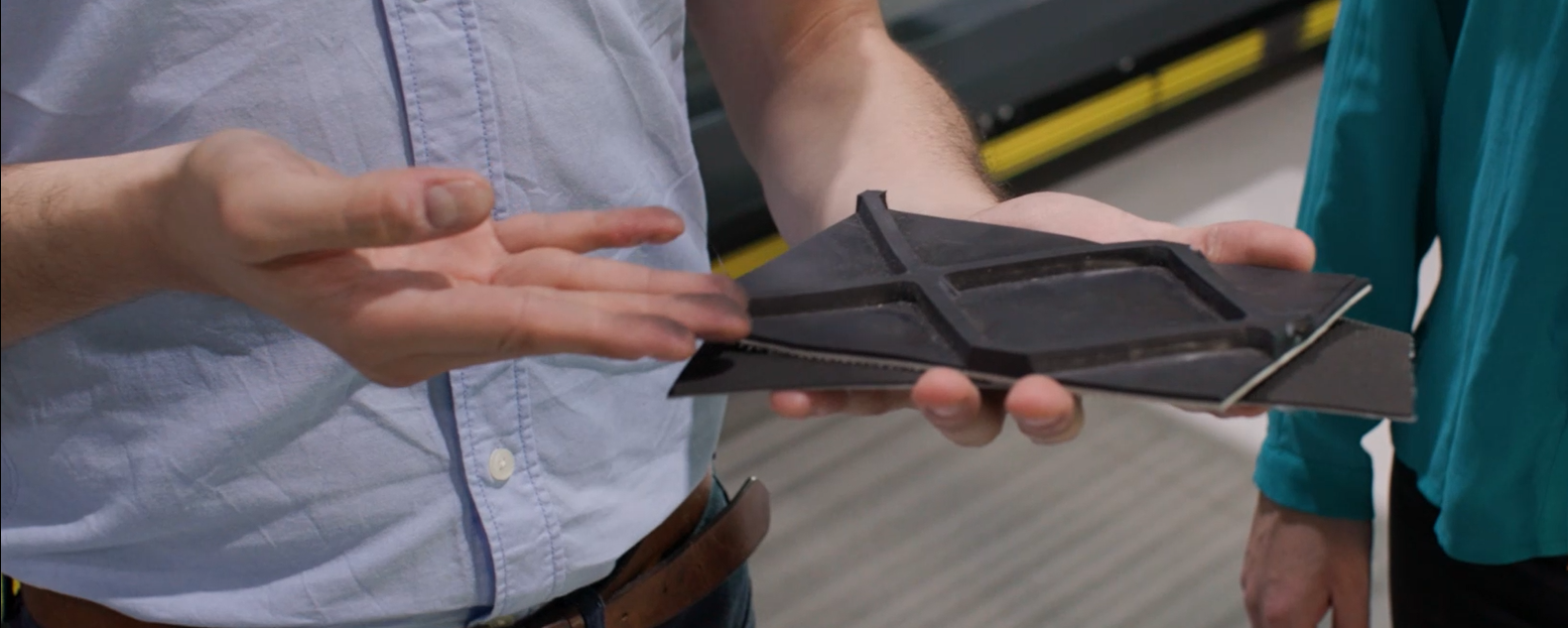Do you have an innovative solution for end-of-life conveyor belts, either by finding an alternative end-of-life high-value application (re-use or upcycling), or by turning them into high-value materials?
Don’t miss the chance to participate in the “turn end-of-life conveyor belts into high-value materials” Open Innovation Challenge launched by Vanderlande: an internationally operating company that supplies transport systems for internal logistics. Vanderlande is part of Toyota Industries and its headquarters are located in Veghel. Vanderlande designs, assembles and supplies material handling systems used in warehouses and distribution centres, sorting systems for parcels and baggage handling systems for airports. In the latter field, the company is the worldwide market leader with a market share of more than 30%. More than 600 airports around the world are equipped with Vanderlande baggage handling systems. Vanderlande is also an important producer in the field of sorting systems for parcels and automatic warehouses.
The objective of the challenge is to find a solution for end-of-life conveyor belts, either by finding an alternative end-of-life high-value application (re-use or upcycling), or by turning them into high-value materials.
How to apply: if you would like the opportunity to submit a solution you are developing, or expertise you have in the above area, please contact us to info@wheesbee.eu for an expression of interest by November 3, 2022 (sign up no later than 5 pm).
Full Challenge description:
Most of Vanderlande’s solutions at customer-operated sites contain conveyor belts, which, in a nutshell, are made of a fixed steel/aluminum structure, a motor, and a belt. The belts used in these conveyors have to be rough and the top layer needs a high friction coefficient to stop the transported items from sliding. At the same time, the belts – and the bottom layer in particular – should be soft enough to slide over a steel bed without much resistance. That is why our belts are primarily made from two materials that are difficult to separate: PVC on top, and polyester on the bottom, along with fire-resistant additives for safety reasons. These additives are hard to recycle. All belts and materials used are highly similar, but they can differ in terms of the textures applied to the belts, size, material and layer thickness, and the plasticizers used.
As a conveyor belt starts to reach the end of its lifespan, the PVC top layer loses its friction capacity. At the same time, the bottom layer starts generating friction, increasing the solution’s energy consumption. Belt thickness may differ across markets. Vanderlande sources conveyor belts from manufacturers worldwide, but all belts must meet similar requirements, with the average lifespan of a belt being between 2 and 5 years, depending on the application. Our belts last an average of 3 years. Currently, the belts are not returned to Vanderlande: customers dispose of them when they reach the end of their useful life. Every year, between 2,500 and 4,000 tons of belts are disposed of every year, including approximately 265 to 400 tons of Vanderlande belts.
There is currently no economic incentive for belt manufacturers to develop sustainable solutions. Although widely studied over the years, no technical innovation has yet been found for recycling or refurbishing traditional PVC/polyester belts. End-of-life belts are currently incinerated or sent to a landfill. Vanderlande’s customers bear the primary responsibility for disposing of the belts, but Vanderlande is eager to take its own responsibility and pro-actively search for more sustainable solutions, due in part to increasing zero-waste demands.
Forbo is Vanderlande’s main belt supplier. Belts from other suppliers for the same applications must comply with the same technical specifications. Tech specs of the most commonly used belts are available.
What is Vanderlande looking for?
The objective of the challenge is to find a solution for end-of-life conveyor belts, either by finding an alternative end-of-life high-value application (re-use or upcycling), or by turning them into high-value materials.
Vanderlande has the following requirements:
- Vanderlande would like to include the potential solution in its customer proposition.
- The business case should be viable. This does not mean that it has to be profitable, but it should at least add value for customers and the planet.
- The solution should be made available to customer sites worldwide.
- Re-use is preferred over recycling. However, Vanderlande is open to any solution.
- Regarding compliance, there is no confidential information.
Nice to have:
- The solution should preferably be implemented within the next 5 years.
- Therefore, the TRL level should preferably be no lower than TRL 6.
Out-of-the-box solutions are highly appreciated.
What is Vanderlande NOT looking for?
Solutions Vanderlande would like to avoid are:
- Using chemicals to process PVC did not work in the past and should therefore be avoided.
- As a B2B company, we are, in principle, focused on B2B solutions. B2C is not preferred and Vanderlande is certainly not looking for applications such as design/art objects or wallets and purses.
What’s in it for you?
Vanderlande has a long-standing relationship with all its clients. If the solution is viable, the participant can be assured of at least 10 years’ worth of business. Vanderlande has a presence in 18 countries, some of which have made circularity a higher priority than others. Furthermore, there are many other companies that use conveyor belts, including parent company Toyota Industries, which means that the market is much larger than Vanderlande alone.
Vanderlande is willing to host the participant in the Vanderlande Innovation Center in Veghel and collaborate on R&D. A pilot budget of at least EUR 10,000 will also be made available, depending on the TRL of the solution.
The Wheesbee team from Innovation Engineering Srl is specialized in supporting Open Innovation initiatives by facilitating the matching between problem owners and problem solvers in the framework of a large network of innovative companies.
Contact us to be part of our network with your Open Innovation Challenges.
